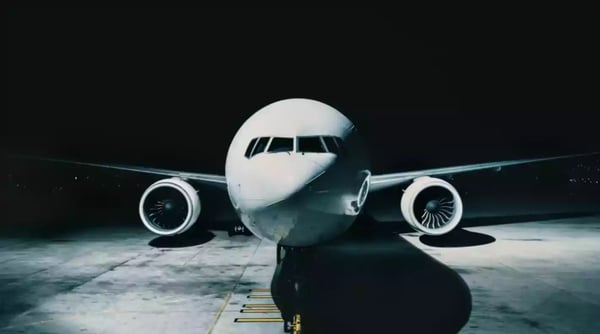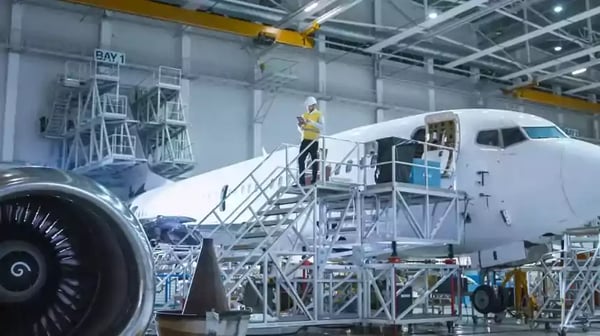The Asia-Pacific aviation industry is currently undergoing an impressive transformation with a strong focus on growth, modernization, and sustainability. Regional and international traffic is significantly increasing in Asia’s largest markets, such as China and India. We can see that the region’s domestic passenger traffic is experiencing rapid expansion, prompting airlines to continuously expand their aircraft fleets and route networks to capitalize on growth prospects. For example, we can look at IndiGo, an Indian airline carrier, which has set a new record by placing an order for 500 Airbus A320 aircraft. This purchase agreement is the largest of its kind in the history of commercial aviation.
%20(1)%20(1)%20(1).webp?width=778&height=583&name=iStock-2064876692%20(1)%20(1)%20(1)%20(1).webp)
Despite the COVID-19 pandemic, the Asian-Pacific market is displaying remarkable resilience and growth. The potential for significant expansion in the Asian market through the implementation of new digital solutions is clear. There are numerous digital technology innovations within the market, including advanced tooling control technology, that are gaining popularity among aviation maintenance professionals. In this blog post, we will explore the major challenges that these professionals face in tooling control, and how these innovative advancements can significantly improve operational efficiency and align with the industry's digital transformation within Asia Pacific.
Tooling control challenges
It is crucial to acknowledge the critical role that tools play in maintaining efficiency and productivity. The process of managing records can be quite challenging, particularly when done manually. This can often result in disruptions in workflows, leading to increased costs in terms of time and resources. Therefore, it is crucial to find efficient ways of keeping track of records to ensure that workflows are not interrupted and resources are utilized optimally.
.webp?width=778&height=518&name=iStock-956829852%20(1).webp)
Tool loss or misplacement
Misplacing or losing tools within the maintenance operation is a continuous issue that often leads to the disruption of workflow, downtime, and unnecessary expenses. This problem can affect a range of industries and can slow down productivity, which can ultimately lead to a decrease in overall revenue. It is essential for airlines and MROs to implement strategies to prevent tool misplacement and loss, such as implementing tracking systems or conducting regular inventory checks.
Calibration delays
Maintaining the accuracy and reliability of aircraft maintenance is of utmost importance, and one crucial aspect of achieving this is by regularly calibrating the tools used in the process. Failure to calibrate some of the tools promptly may result in inaccurate measurements and, consequently, affect the overall results of the maintenance process. Moreover, documenting all activities within a digital platform is highly recommended as it helps eliminate the possibility of human errors that might occur during manual documentation.
Inefficient tracking processes
When airlines or MROs rely on outdated or inefficient methods for tracking usage of their tools and resources, it can result in many issues. These can include confusion among team members, errors in the tracking process, and difficulty in monitoring the usage of these tools.
Moving towards digitalization
According to SITA's latest Air Transport IT Insights report, most airlines are seeking ways to reduce paper usage, with nearly all aiming to achieve paperless processes by 2025. This industry-wide shift is more than just a trend; it is a strategic decision to streamline operations, enhance productivity, and contribute to a greener future. For aviation maintenance, the transition to digitalization processes holds immense potential. The adoption of innovative tooling control technologies, such as RFID tracking systems, barcode readers, tags, and lasers, aligns seamlessly with digitalization. Let us explore how:
- RFID tracking systems: Using RFID technology for real-time tracking minimizes paper-based records, enhancing efficiency, visibility, and sustainability goals. Though the initial cost may be high, the long-term benefits of reduced paper usage and improved operational accuracy justify the adoption of RFID technology in aviation maintenance operations.
- Barcode readers: Barcode solutions replace manual data entry with digital scans, reducing paper waste while enhancing accuracy and real-time data capture. It is user-friendly and requires minimal training for operators. Scanning a barcode is a straightforward process that does not require extensive technical expertise.
- Laser technology for precision: Laser-based tool control ensures accurate calibration without the need for paper documentation. This contributes to streamlined maintenance processes and a reduction in paper usage.
Digitalization is here to stay
At QOCO Systems Ltd, we take pride in being customer-centric. This means that we prioritize our customer's needs and continuously update our features based on their valuable feedback and market trends. As digitalization becomes more prevalent in the aviation industry, MROTools.io leads by implementing advanced technology to enhance processes, resulting in cost savings, efficiency, and sustainability. The platform manages tool distribution, allowing engineers to swap tools on the line with traceability, compliance, and quality assurance. The increasing prevalence of digitalization indicates a transformative era that is here to stay, and QOCO can continue to grow and make an impact within the industry through the expanding Asian-Pacific market.
Be sure not to miss out on the latest technologies. Book a demo today!



 Elisabeth Tadoe
Elisabeth Tadoe
 If you are interested in knowing how you can improve your efficiency in maintenance operations, book a 30-minutes discovery call with us.
If you are interested in knowing how you can improve your efficiency in maintenance operations, book a 30-minutes discovery call with us.

